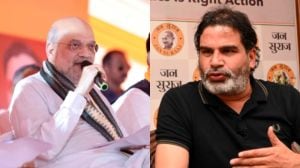Iraq refused oil to IOC because NDA said no to paying surcharge
In December 2001, the same month that Andaleeb Sehgal’s Hamdan Exports was depositing the last instalment of its Rs 3.22-crore “il...

In December 2001, the same month that Andaleeb Sehgal’s Hamdan Exports was depositing the last instalment of its Rs 3.22-crore “illegal surcharges” into the Jordan National Bank against oil rights allotted to Natwar Singh and the Congress Party, the Saddam Hussein regime refused oil to Indian Oil Corporation insisting that it pay a surcharge of 10 per cent per barrel into a specified Lebanese bank account.
While a section within the then BJP-led NDA government did argue for paying the surcharge so that IOC could get the crude cheap since Saddam was offering a 50-cent rebate on the low UN price—the final decision was against it.
Iraq’s refusal came after IOC picked up 2 million barrels of oil from Baghdad’s state-owned SOMO—the same firm from which Masefield AG picked up 2.96 million barrels against rights allotted to Natwar and Congress, according to the Volcker report.
But because IOC refused to pay surcharge, further supplies were blocked.
A team of IOC officials was rushed to Baghdad where, according to top sources involved in the negotiations, Saddam Hassan, SOMO’s director-general, handed an account number in a Lebanese Bank in which IOC was asked to park $1.5 million as surcharge for 15 million barrels of oil.
“We wanted additional oil from Iraq under the oil-for-food programme but we did not agree to pay through any source other than the UN,’’ then Petroleum Minister Ram Naik told The Sunday Express today. “We refused the deal.”
Central Vigilance Commissioner P Shankar confirmed that an ‘‘offer’ for paying a additional surcharge was made during the NDA regime, when he was the Petroleum Secretary. “For a few days there was a lot of excited talk about the proposal. We were desperate for cheap oil but we found the proposal too risky,” Shankar said.
He added that there were discussions about the Indian Oil Corporation and the State Trading corporation executing the offer. ‘‘But when we found that the proposal was not legally sound and that it would mean a clear violation of UN sanctions, we did not go further.’’
‘‘I was uncomfortable about the illegality of the scheme and since we felt it might jeopardise national security and violate UN sanctions, we did not go further,’’ Shankar recalled.



- 01
- 02
- 03
- 04
- 05




























